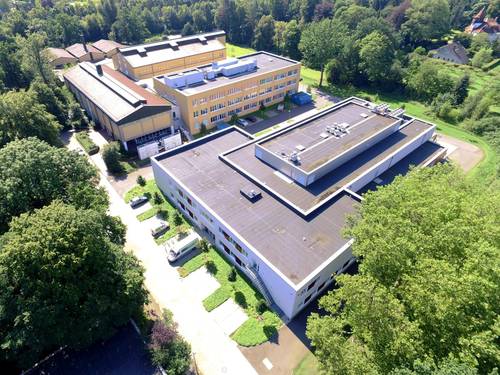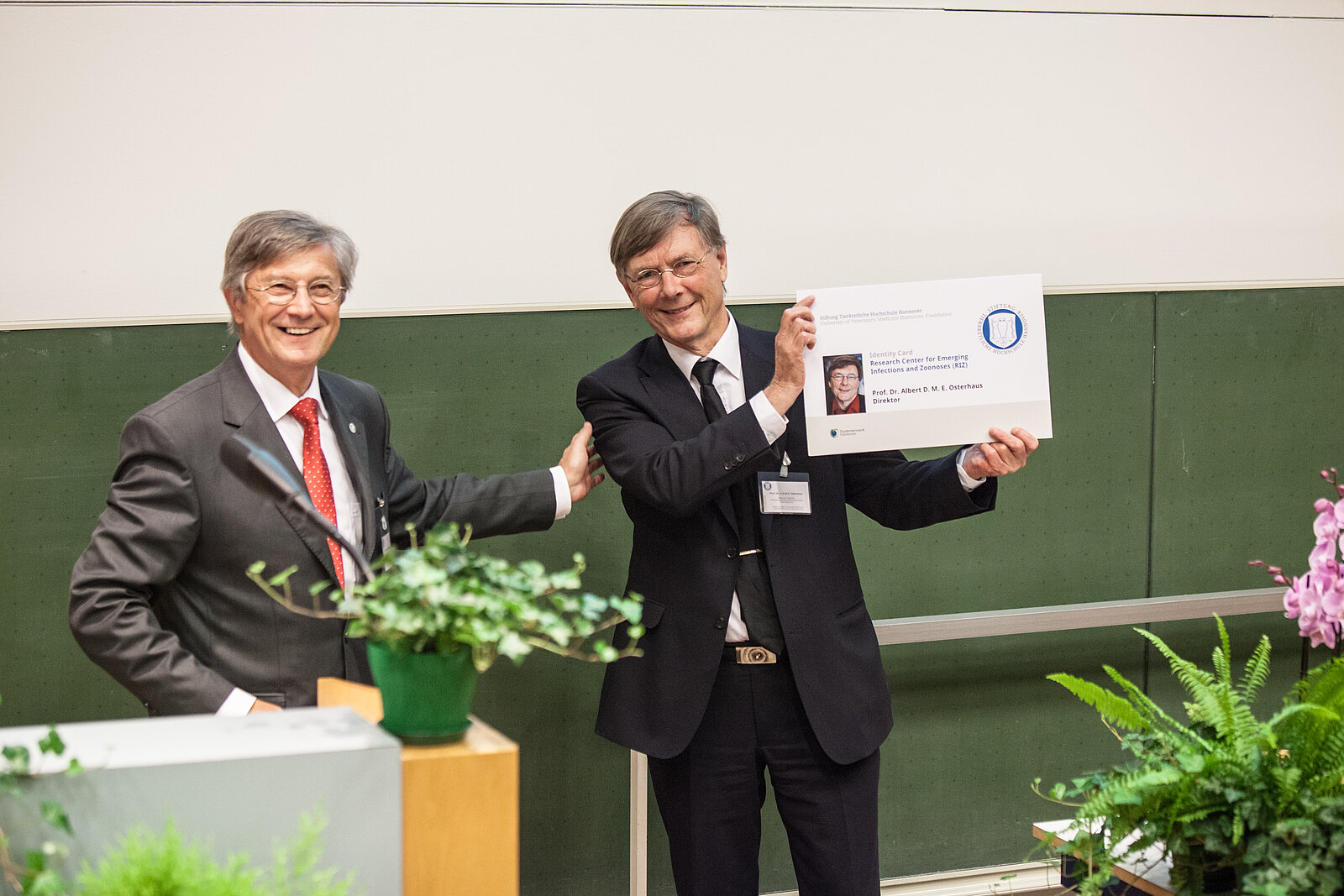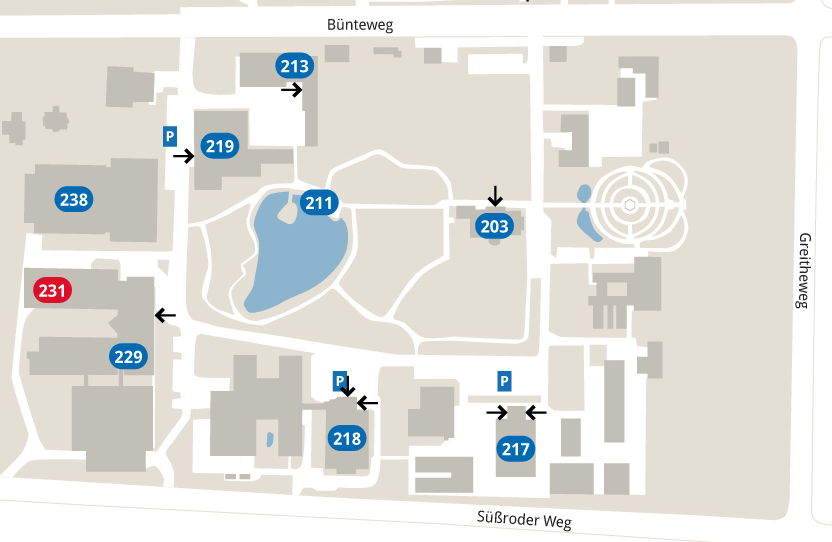
About the RIZ
The Research Center for Emerging Infections and Zoonoses (RIZ) is a state-of-the-art "One Health" research center embedded in the University of Veterinary Medicine Hannover Foundation. With its high-security laboratories and animal facilities, it is available to the scientists of the University of Veterinary Medicine Hannover Foundation as a central service facility in all areas of infection research.
The development of the RIZ research infrastructure was financed by the federal and state governments and represents a unique catalyst for research into infectious diseases. Since its opening in 2014 by the founding director of the RIZ, the world's leading scientist in virology Prof. A.D.M.E. Osterhaus, PhD, DVM, numerous scientists from the various fields of infection medicine have been working together to improve the health and well-being of humans, animals and their environment through a cross-sectoral and collaborative approach.
Head of Scientific Administration & Biosafety
Since 2019, Prof. Dr. Maren von Köckritz-Blickwede has served as the Head of Scientific Administration and Biosafety at the RIZ. In this role, she coordinates all matters related to biosafety and animal welfare, ensuring compliance with legal regulations and continuously advancing the relevant standards within the RIZ.
She also leads the RIZ Core Team, which advises, supports, and assists researchers in the planning and execution of their projects.
Research Interest
Virology Group (Professor Dr. Paul Becher)
- Investigation of pestiviruses and other veterinary relevant RNA viruses and zoonotic pathogens
- Identification and characterization of cellular receptors and determinants of virus entry
- EU and WOAH reference laboratory for Classical Swine Fever
Parasitology Group (Professor Dr. Stefanie Becker)
- The role of mosquitoes as vectors, their distribution and ecology in terms of the spread of vector-borne diseases
- Interactions and spread of arboviruses and their vectors
Becker Group
Molecular and Clinical Infection Biology Group (Professor Dr. Gisa Gerold)
- Molecular basis of zoonotic RNA viruses and species-specific RNA virus-infections
- Investigations of host proteins and protein networks related to host changes and respective antiviral therapeutic approaches
Infection Immunology Group (Professor Dr. Bernd Lepenies)
- Identification of novel C-type lectin receptor (CLR) ligands on pathogens by glycan/glycoprotein array
- Targeting of CLRs on antigen-presenting cells using carbohydrate ligands
- Investigation of CLR functions in animal models of infection and autoimmunity
Infection Biology Group (Professor Dr. Albert D.M.E. Osterhaus)
- Identify emerging and possibly zoonotic infectious diseases in host reservoirs
- Develop and improve therapeutic measures for infectious diseases
- Identifying immune mechanisms and developing vaccines
Immunovirology Group (Professor Dr. Guus Rimmelzwaan)
- Effect of adaptive immunity on infections with zoonotic viruses and correlates of protection
- Viral evasion strategies and immunity to viruses
- Intervention strategies, vaccines and treatment (antiviral and host response modifiers)
Zoonotic Virology Group (Professorin Dr. Asisa Volz)
- Prevalence of viruses (e.g. West Nile virus) in animal hosts
- Chronic viral infections in mammals
- Immunogenicity and immunoprophylaxis in mammals
Infection Biochemistry Group (Professorin Dr. Maren von Köckritz-Blickwede)
- Importance of extracellular networks in the innate immune response to zoonotic infections
- Research into new therapeutic approaches that strengthen the immune system against infections
- Role of neutrophils in pathogen-host interaction
- Hypoxia and oxygen as immune modulators
Host-Virus Interactions Junior Research Group (Dr. Imke Steffen)
- New RNA viruses and their interaction with the human and animal host
- The role of flavivirus NS1 proteins in viral pathogenesis
- The role of MAVS in CNS-resident cells
Contact
University of Veterinary Medicine Foundation, Hannover
Research Center for Emerging Infections and Zoonoses
Bünteweg 17, Building 231 and 238
30559 Hannover
Tel.: +49 511 953-6130
Research Center for Emerging Infections and Zoonoses
Directions
Address for navigational systems:
Bünteweg 17, 30559 Hannover
By Public Transport
From the main station with the underground lines 1 (direction Laatzen / Sarstedt), 2 (direction Rethen) or 8 (direction Messe / Nord) go two stops to Aegidientorplatz. Change at Aegidientorplatz and take line 6 (direction Messe / Ost) to the Bünteweg / Tierärztliche Hochschule stop. The stop is right in front of the administration building (TiHo Tower, Bünteweg 2) of the university. The entrance to Bünteweg 17 is about 600 meters from the TiHo Tower on the right-hand side of the street.
By Car
From North/East/West
Drive south on the Messeschnellweg (A37) (Messe) and leave the Schnellweg at the Bult exit. Then turn left and follow the road towards Bemerode. The Bünteweg branches off to the left behind the railway underpass. The TiHo-Tower is located on the corner of Bemeroder Straße / Bünteweg. The entrance to Bünteweg 17 is about 600 meters from the TiHo Tower on the right-hand side of the street.
From the South
On the Messeschnellweg (A37) towards Celle, turn right at the Bult exit towards Bemerode. The Bünteweg branches off to the left behind the railway underpass. The TiHo-Tower is located on the corner of Bemeroder Straße / Bünteweg. The entrance to Bünteweg 17 is about 600 meters from the TiHo Tower on the right-hand side of the street.





